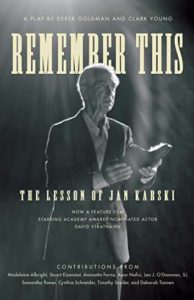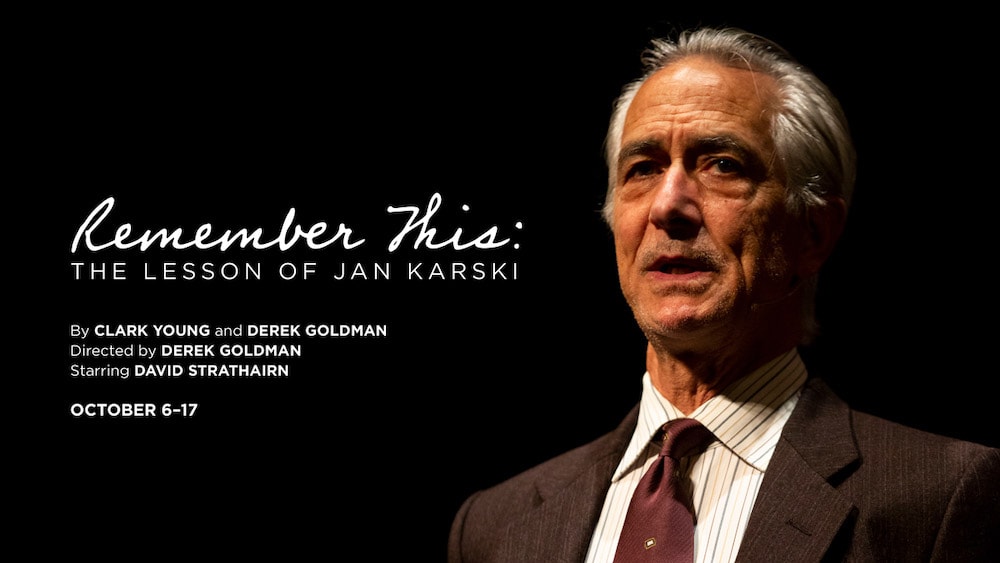In politics, being deceived is no excuse.
—Leszek Kolakowski
Jan Karski’s heroism, as revealed in Remember This at STC, reminds us that there is no substitute for telling the truth. The spectacularly affecting performance of David Strathairn as Jan Karski, the man who tried to warn the world about the Holocaust, becomes not only an emotional but a moral experience.
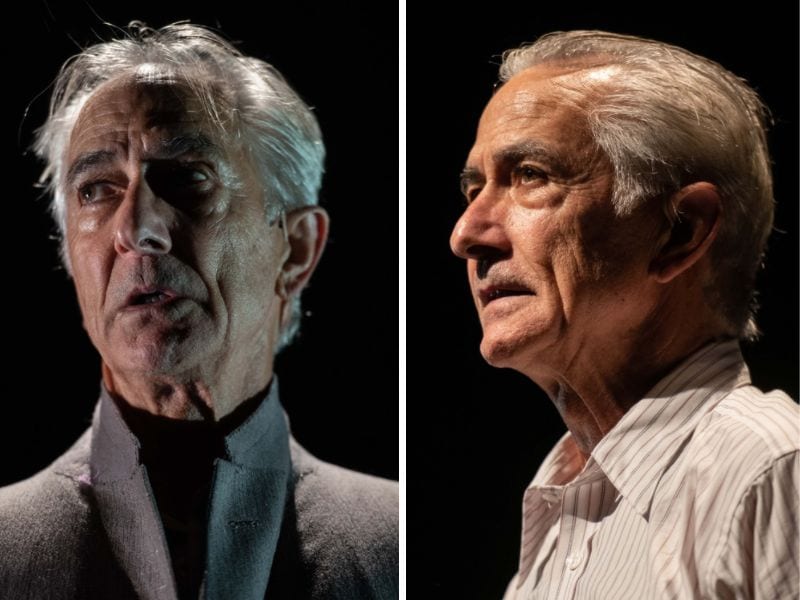
A handsome volume, Remember This: The Lesson of Jan Karski (2021) is available for purchase in the lobby. It includes the script as well as articles and interviews about the production, from notables such as Samantha Power, Timothy Snyder, Madeleine Albright, and Deborah Tannen. There will soon be a feature film starring Strathairn.
In the book, Strathairn remarks:
I approach material…. What am I going to learn from this story? Is this going to make me a little bit wiser, smarter? Is it going to open my heart a little more?
In the case of Remember This, the answer is yes, yes, and yes.
As historian Timothy Snyder states: “We would all like to imagine that we would have tried to stop the Holocaust. We would have crept into the ghettos to learn the truth, found our way into the Allied capitals, and made the case for action.”
But, as Snyder rightly observes, only one of the approximately two billion adults on the planet did: the Polish courier, Jan Karski.
Many now believe that there is once again a threat of fascism, not only across the world but right here in the United States. Today, the lesson of Jan Karski has become more crucial than ever.
In Snyder’s book On Tyranny: Twenty Lessons from the Twentieth Century (2017, now obtainable in a graphic version), he offers a series of actions we as individuals can take, or avoid, to stem the tide of authoritarianism. I offer a few of them here, as a tribute to this production and Karski’s extraordinary example.
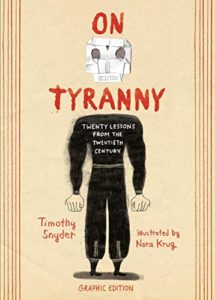
In March 1938, Snyder states, it was the anticipatory obedience of the Austrians that sealed the doom of the Austrian Jews. When the Nazis forced Jews to scrub the streets to remove any symbols representing Austria as an independent nation, others looked on and did nothing. Both Nazis and non-Nazis stole Jewish property. This passive reaction showed the Nazis what could be accomplished. In November of that year, they organized the notorious pogrom Kristallnacht.
Stand out.
Snyder recounts the story of high-school-age Teresa Prekerowa, whose family had to move to Warsaw when their property was confiscated by the Germans. She had two brothers in German prisoner of war camps. Her father had been arrested, and one of her uncles was killed in battle.
In 1940 the Warsaw ghetto was established, and Teresa noticed that a Jewish girl, a friend of one of her brothers, had been taken there.
Teresa went to the ghetto several times at great risk to deliver food and medicine. Thinking not only of herself but of others, she helped the girl and her family escape.
Believe in truth.
To abandon facts, says Snyder, is to abandon freedom. Constant lying, ritualistic repetition, and magical thinking are the building blocks of a fantasy-driven society. Faith in the authority figure becomes paramount, and the small truths of our own experience become meaningless and unimportant.
Snyder cites the words of Romanian-French playwright Eugene Ionesco (1909–1994) as he watched friends disappear into fascism:
University professors, students, intellectuals were turning Nazi, becoming Iron Guards, one after the other. At the beginning, certainly they were not Nazis. About fifteen of us would get together to talk and to try to find arguments opposing theirs. It was not easy… From time to time, one of our friends said: “I don’t agree with them, to be sure, but on certain points, nevertheless, I must admit, for example, the Jews….,” etc. And this was a symptom. Three weeks later, this person would become a Nazi.
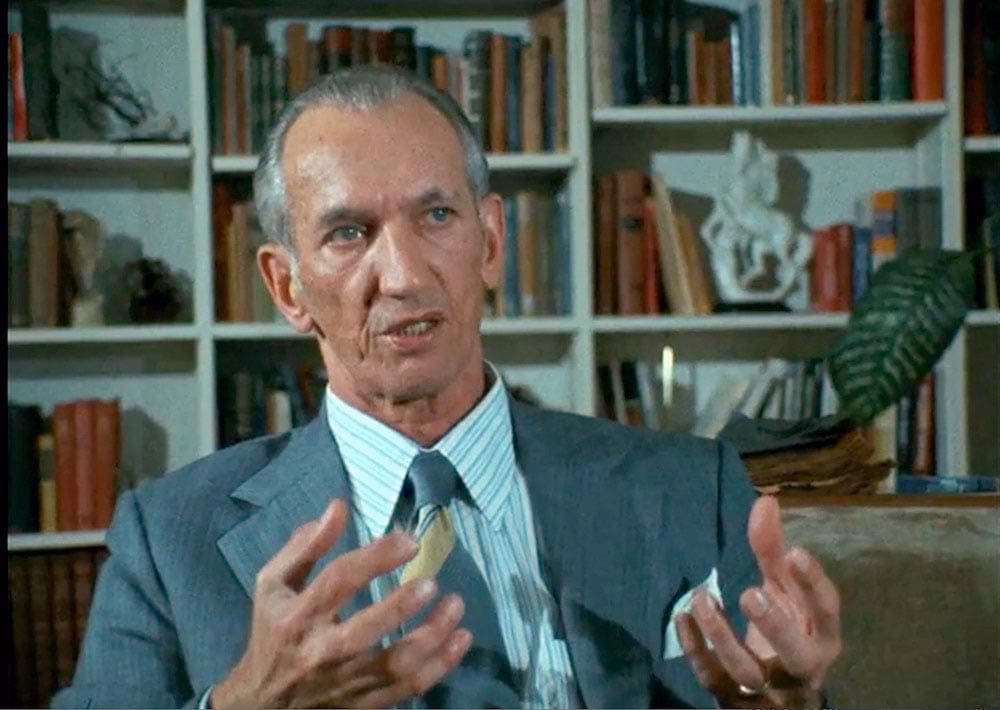
One of the most moving moments in Remember This at STC occurs when we are granted a glimpse of the real Jan Karski, in Claude Lanzmann’s documentary Shoah (1985). Karski attempts to remember, and then breaks down into sobs.
Later, as the narrator, Straithairn says:
How do we know what to believe?
How do we know what to believe in?
Is there something we can do that we are not already doing?
These questions haunt me now….
And I want it to be so.
Karski asked the necessary questions. Thanks to his example, we can ask them once again.
Running Time: About 90 minutes, with no intermission.
Remember This: The Lesson of Jan Karski plays through October 17, 2021, at the Shakespeare Theatre Company’s Michael R. Klein Theatre (formerly the Lansburgh), 450 7th Street NW, Washington, DC. Tickets ($35 – $120) are available online.
Shakespeare Theatre Company offers several discount ticket programs, including reduced ticket prices for patrons under 35 years old, patrons over 60 years old, and members of the military and first responders. Discounted tickets are also available for 3-, 4-, and 5-play subscribers. On Neighborhood Nights, patrons residing or living in Penn Quarter (home of Sidney Harman Hall and the Michael R. Klein Theatre at the Lansburgh), Capitol Hill (home of STC’s administrative offices), University Heights/Brookland (home of STC’s scenery and prop shops), and Southwest DC (home of STC’s future administrative offices) may purchase deeply discounted tickets for select performances. For more information about STC’s various discount ticketing programs, visit shakespearetheatre.org/
For Shakespeare Theatre Company’s Health and Safety policies and procedures, click here.
SEE ALSO:
A performance of magnitude and nuance: David Strathairn as Jan Karski review by Susan Galbraith
David Strathairn to star at STC as WWII resistance fighter Jan Karski interview feature by Alexandra Bowman
Shakespeare Theatre Company to resume full-capacity shows in September season announcement
